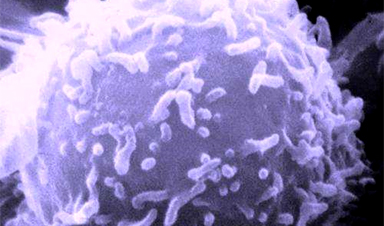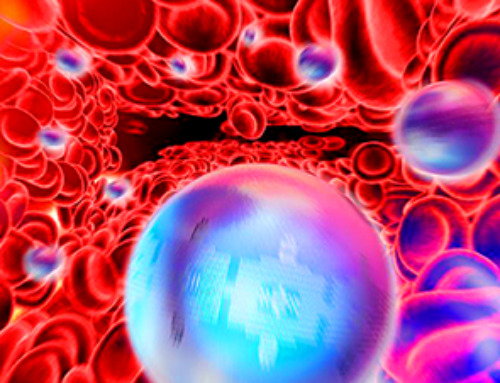Most tumors contain regions of low oxygen concentration where cancer therapies based on the action of reactive oxygen species are ineffective. Now, American scientists have developed a hybrid nanomaterial that releases a free-radical-generating prodrug inside tumor cells upon thermal activation. As they report in the journal Angewandte Chemie, the free radicals destroy the cell components even in oxygen-depleted conditions, causing apoptosis. Delivery, release, and action of the hybrid material can be precisely controlled.
Many well-established cancer treatment schemes are based on the generation of reactive oxygen species (ROS), which induce apoptosis for the tumor cells. However, this mechanism only works in the presence of oxygen, and hypoxic (oxygen-depleted) regions in the tumor tissue often survive the ROS-based treatment. Therefore, Younan Xia at the Georgia Institute of Technology and Emory University, Atlanta, USA, and his team have developed a strategy to deliver and release a radical-generating prodrug that, upon activation, damages cells by a ROS-type radical mechanism, but without the need for oxygen.
The authors explained that they had to turn to the field of polymerization chemistry to find a compound that produces enough radicals. There, the azo compound AIPH is a well-known polymerization initiator. In medicinal applications, it generates free alkyl radicals that cause DNA damage and lipid and protein peroxidation in cells even under hypoxic conditions. However, the AIPH must be safely delivered to the cells in the tissue. Thus, the scientists used nanocages, the cavities of which were filled with lauric acid, a so-called phase-change material (PCM) that can serve as a carrier for AIPH. Once inside the target tissue, irradiation by a near-infrared laser heats up the nanocages, causing the PCM to melt and triggering the release and decomposition of AIPH.
Image Credit: Triche National Cancer Institute
News This Week
Fever-Proof Bird Flu Variant Could Fuel the Next Pandemic
Bird flu viruses present a significant risk to humans because they can continue replicating at temperatures higher than a typical fever. Fever is one of the body’s main tools for slowing or stopping viral [...]
What could the future of nanoscience look like?
Society has a lot to thank for nanoscience. From improved health monitoring to reducing the size of electronics, scientists’ ability to delve deeper and better understand chemistry at the nanoscale has opened up numerous [...]
Scientists Melt Cancer’s Hidden “Power Hubs” and Stop Tumor Growth
Researchers discovered that in a rare kidney cancer, RNA builds droplet-like hubs that act as growth control centers inside tumor cells. By engineering a molecular switch to dissolve these hubs, they were able to halt cancer [...]
Platelet-inspired nanoparticles could improve treatment of inflammatory diseases
Scientists have developed platelet-inspired nanoparticles that deliver anti-inflammatory drugs directly to brain-computer interface implants, doubling their effectiveness. Scientists have found a way to improve the performance of brain-computer interface (BCI) electrodes by delivering anti-inflammatory drugs directly [...]
After 150 years, a new chapter in cancer therapy is finally beginning
For decades, researchers have been looking for ways to destroy cancer cells in a targeted manner without further weakening the body. But for many patients whose immune system is severely impaired by chemotherapy or radiation, [...]
Older chemical libraries show promise for fighting resistant strains of COVID-19 virus
SARS‑CoV‑2, the virus that causes COVID-19, continues to mutate, with some newer strains becoming less responsive to current antiviral treatments like Paxlovid. Now, University of California San Diego scientists and an international team of [...]
Lower doses of immunotherapy for skin cancer give better results, study suggests
According to a new study, lower doses of approved immunotherapy for malignant melanoma can give better results against tumors, while reducing side effects. This is reported by researchers at Karolinska Institutet in the Journal of the National [...]
Researchers highlight five pathways through which microplastics can harm the brain
Microplastics could be fueling neurodegenerative diseases like Alzheimer's and Parkinson's, with a new study highlighting five ways microplastics can trigger inflammation and damage in the brain. More than 57 million people live with dementia, [...]














Leave A Comment